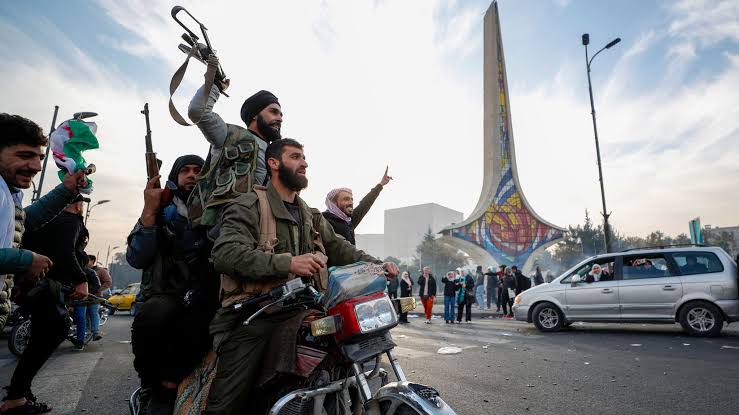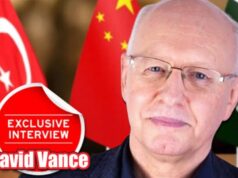Putin grants asylum to Assad after Damascus falls

By M A Hossain
Russian President Vladimir Putin has personally approved the granting of asylum to former Syrian President Bashar Assad and his family following the dramatic fall of Damascus to opposition forces.
This development underscores Moscow’s commitment to its allies during challenging circumstances and highlights the precarious nature of Syria’s political landscape after more than a decade of civil war.
The Kremlin’s confirmation of Assad’s arrival in Moscow comes after reports of his ousting from power following the Syrian capital’s rapid seizure by Hayat Tahrir al-Sham (HTS) jihadists and US-backed Free Syrian Army (FSA) militants.
Dmitry Peskov, Kremlin spokesperson, confirmed on December 9 that Putin himself approved the asylum, stating, “Such decisions cannot be made without the head of state; it is his decision.” Despite confirming Assad’s presence, Peskov noted that no meeting between Putin and Assad is planned.
The fall of Damascus represents a significant turning point in Syria’s civil conflict, which began in 2011. This sudden collapse followed years of fragile truces, brokered with significant input from Moscow and Ankara, and a prolonged stalemate on the battlefield.
The events leading to Assad’s departure suggest a rapid unraveling of his government’s authority, further exacerbated by the resurgence of militant groups.
Mikhail Ulyanov, a senior Russian diplomat, reaffirmed Russia’s steadfast support for Assad, contrasting Moscow’s approach with Washington’s.
“Russia does not betray its friends in difficult situations… unlike the US,” he said, highlighting the strategic depth of Moscow’s alliances.
Ulyanov’s comments echo the sentiment that Russia views its role in Syria as a long-term investment, underpinned by military, political, and economic considerations.
The granting of asylum also illustrates Russia’s attempt to present itself as a reliable ally in a region often marked by shifting alliances and external interventions.
This move may strengthen Moscow’s standing among other nations wary of the perceived unpredictability of Western powers.
The lightning advance by opposition forces that culminated in the capture of Damascus caught many observers by surprise.
HTS jihadists and the FSA led a swift offensive starting in late November, marking the end of the uneasy peace that had prevailed since a 2020 truce.
The Syrian Army reportedly stood down during the final stages of the assault, signaling a calculated retreat or capitulation.The anti-Assad forces wasted no time declaring him deposed and claiming control over the government.
This rapid shift of power has left Syria in a state of uncertainty, with a fragmented opposition struggling to present a unified front.
Amid the chaos, Assad reportedly negotiated his exit through back-channel talks with unspecified armed groups.
He agreed to step down and instructed officials to ensure a “peaceful transfer of power,” according to a statement from the Russian Foreign Ministry.
However, the future of Syria under opposition control remains unclear, with various factions vying for dominance.
Despite the fall of Damascus, Russia’s military presence in Syria remains intact.
Moscow operates a naval facility in Tartus and an air base near Latakia, both of which are reportedly on high alert but not facing immediate threats.
These bases have been central to Russia’s involvement in the Syrian conflict since its intervention in 2015 to support Assad’s government.
Russia’s defense establishment has urged the newly empowered militants to avoid violence and support UN-backed efforts for national reconciliation. The Kremlin’s priority appears to be maintaining regional stability while safeguarding its strategic interests in the Eastern Mediterranean.
Syria’s descent into chaos began in 2011, as peaceful protests against Assad’s government escalated into a full-blown civil war.
The conflict drew in numerous external players, including the United States, Turkey, Iran, and Russia, each pursuing their strategic objectives.
Over time, extremist groups like ISIS and HTS emerged as dominant forces among the anti-Assad factions, complicating efforts for a peaceful resolution.
Russia’s intervention in 2015 marked a turning point in the conflict, enabling Assad’s forces to reclaim significant territory. However, the costs of the war, both human and economic, have been staggering.
Over half a million people have died, millions have been displaced, and Syria’s infrastructure lies in ruins.
The swift fall of Damascus raises questions about the role of external powers in shaping Syria’s future.
The United States has faced criticism for its support of opposition groups, some of which have been accused of human rights violations.
Moscow, meanwhile, has sought to portray itself as a stabilizing force, though its support for Assad has also drawn condemnation.
The latest developments may signal a shift in the balance of power in the region, with militant groups emboldened by their success in Damascus.
The extent to which these groups can consolidate their gains and establish governance remains uncertain, particularly given their ideological differences and historical rivalries.
The fall of Damascus and Assad’s exile are likely to exacerbate Syria’s already dire humanitarian crisis.
Millions of Syrians remain displaced, with many living in refugee camps or under harsh conditions in opposition-held territories.
The international community faces renewed pressure to address the crisis, though efforts to provide aid and support have been hampered by political and logistical challenges.
The reaction from global powers has been mixed. While some have welcomed Assad’s departure as a step toward resolving the conflict, others have expressed concerns about the rise of extremist groups and the potential for further destabilization.
As Assad begins his exile in Moscow, the future of Syria hangs in the balance. The country’s fractured opposition faces the monumental task of rebuilding governance structures and addressing the grievances that fueled the uprising against Assad’s regime.
For Russia, Assad’s asylum presents both opportunities and challenges. While it underscores Moscow’s commitment to its allies, it also places the Kremlin at the center of a highly volatile situation.
The extent to which Russia can influence Syria’s future remains uncertain, particularly as it navigates its relationships with other regional players, including Turkey and Iran.
The fall of Damascus marks the end of an era in Syrian politics, but it is far from the conclusion of the country’s long and painful journey toward stability.
How the international community responds to this latest chapter will shape the region’s trajectory for years to come.




